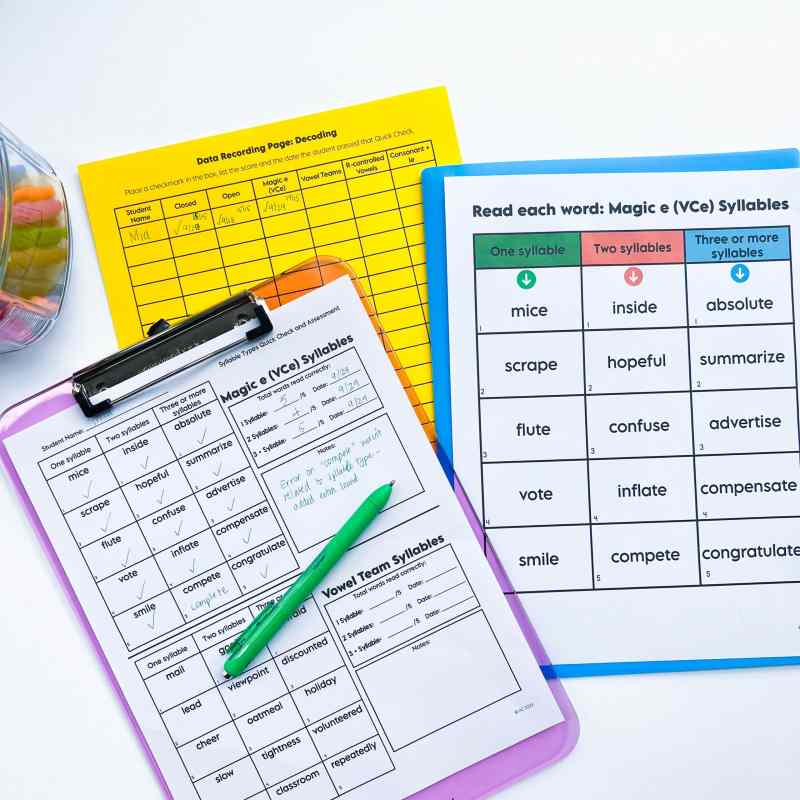Upper elementary students have texts that often include multisyllabic words. Breaking words down to syllables can be very challenging for these students, which is why I’m here to share 3 ways to use syllables worksheets for 3rd-5th Grade. I want to help you help those readers. Let’s first take a look at why this happens.
You may have students who are expert one syllable word decoders, but throw new words in front of them, that is longer and more challenging and they struggle to break the word down. The reason students struggle with multisyllabic words is likely because they haven’t actually mastered the sounds of individual phonics patterns, such as an individual vowel sound. So their brain slows down and has a tough time breaking down more complex words. They might start to break the word down by every single sound, but we want those students to look for parts of the word they already know- and break the word down by syllables instead. When the reader finds a chunk of the word they already know, their brain can move on to the next part of the word.
For example: if the word is detail, some students will say each sound: d-e-t-a-i-l. But instead, we want readers to see the word like this: de-tail. By applying their knowledge of vowel teams, a student can quickly see the word “tail” in detail.
The reader needs to be able to divide the word into manageable chunks that they already recognize. When students can divide words by syllable parts, more complex words will be easier for them to read. By identifying the types of syllables present in a word, readers will become more capable at reading multisyllabic words. Focusing on syllable division rules can lead to more proficient readers. I’ve got an easy way for you to help students improve their reading of multisyllabic words. Read on to see how my syllables worksheets can help your readers.
Focus on the six Syllable Types
My new Phonics Focused Review Passages focus on the six syllable types. Each passage comes with a specific syllable type to focus on while reading. There are 5 passages included for each of the six syllable types, for each grade level, for 3rd grade, 4th grade, and 5th grade. These syllable worksheets encourage readers to apply their understanding of syllables, in context. Then students focus on the concept of syllables at the word level when highlighting words that match up to the specified syllable type. As a follow up activity on these syllables worksheets, students will break down the focus words to individual syllables. Focusing on syllables both in context and at the word level will help readers be better decoders, as well as better spellers. Spelling skills are likely to improve with the focus on syllable types.
Key Features of the Syllables Worksheets
- These new passages each include a specific syllable type focus. These will give your readers a chance to practice decoding words of different syllable types, in context.
- The follow up word work and syllable breakdown activities will give them another opportunity to show their proficiency in syllable division rules.
- Comprehension questions are also included to help you see that students are not only decoding what they’re reading but also understanding those more challenging words!
- I also included reference guides (full page and smaller) for students to refer to when working on these passages.
- You’ll also see a word list with the syllable type focus words for each passage broken down by matching syllable, as well as an answer key for the comprehension questions.
Syllable Types Included:
- Closed
- Open
- Magic e (VCe)
- Vowel teams
- R-controlled vowels
- Consonant + le
3 Ways to Use Syllable Worksheets:
1. To identify areas student struggle when it comes to syllable types.
2. To practice improving reading of words with different syllable types.
3. To complete repeated readings to focus on fluency.
By focusing on syllable types with your readers, you are actually being given such valuable diagnostic information about each reader. You can start to see connections between each syllable type and areas where students need further guidance.
For example:
Students struggling with reading closed syllables ➡️ need to review short vowels.
Students struggling with open syllables ➡️ need to review long vowels.
(etc.)
Syllable types naturally incorporate all those important phonics skills/patterns. They go hand-in-hand. While studying syllable types at the primary grades looks different than it does in the upper grades, it’s important that readers have time to practice applying their knowledge of decoding words with different syllable types, in context.
Grab the various syllable worksheets here:
3rd-5th Grade Bundle or Kindergarten-5th Grade Bundle for easy differentiation!
Free Syllable Types Assessment
Need a way to evaluate your readers’ knowledge of each syllable type? You’re going to love my Syllable Types Quick Check Assessments. These will help you see if your students have an understanding of syllables. You may see that can read one or two syllable words, but not three or more syllable words, of a specific type. Closed, open, magic e (VCe), vowel teams, r-controlled vowels, and consonant + le are all included on the assessment, just like on the syllable worksheets. These are great to use at the beginning of the year, prior to conferences, when you return from winter break, or at the very end of the school year. Once you’ve evaluated your readers, you can then have them start working on improving areas where they struggle. These Phonics Focused Review Passages are a great way to help readers improve their decoding of multisyllabic words.
Want to read more about diagnostic info you can gain from reading assessments? Free Phonics Assessment for Kindergarten-5th Grade











